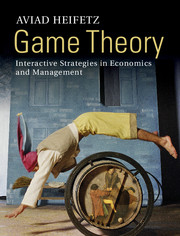Book contents
- Frontmatter
- Contents
- Foreword
- Part I Strategic interactions as games
- Part II Basic solution concepts for strategic form games
- Part III Prominent classes of strategic form games
- Part IV Uncertainty and mixed strategies
- Part V Advanced topics in strategic form games
- Part VI Dynamic games
- Part VII Repeated games
- Index
Part V - Advanced topics in strategic form games
Published online by Cambridge University Press: 05 August 2012
- Frontmatter
- Contents
- Foreword
- Part I Strategic interactions as games
- Part II Basic solution concepts for strategic form games
- Part III Prominent classes of strategic form games
- Part IV Uncertainty and mixed strategies
- Part V Advanced topics in strategic form games
- Part VI Dynamic games
- Part VII Repeated games
- Index
Summary
INTRODUCTION
Part V collects several advanced topics in strategic form games. Chapter 14 discusses the solution concept called rationalizability, based on the notion of a never-best-reply strategy, one which is not a best reply for any belief the player may have about her rivals’ choice profiles. A strongly dominated strategy is never-best-reply, but we show that there are games in which never-best-reply strategies need not be strongly dominated by some other (pure) strategy; however, every never-best-reply strategy always turns out to be dominated by some mixed strategy in the mixed extension of the game.
Since a rational player will never choose a strategy which is never-best-reply, it makes sense to define an iterative elimination process in which, at each round, strategies that are never-best-reply (in the game remaining at that stage) are eliminated. The strategies surviving this elimination process are called rationalizable. Only rationalizable strategies will be played by players who are rational and believe that there is common certainty among the players that they are all rational.
Chapter 15 addresses the topic of equilibrium stability under an updating process, such as the best-reply dynamics in which the players respond optimally to their peers’ behavior in the previous round of the game. The chapter provides the basic definition of a discrete dynamical system, the notion of a fixed point in it, and various notions of stability of fixed points. In an updating dynamics such as the best-reply dynamics, the Nash equilibria of the game are fixed points of the dynamics, but there are games in which some Nash equilibria are unstable fixed points. Such Nash equilibria are hence a weaker prediction for the outcome of the game. We study this phenomenon for two of the coordination games which were defined in Chapter 9.
- Type
- Chapter
- Information
- Game TheoryInteractive Strategies in Economics and Management, pp. 235 - 238Publisher: Cambridge University PressPrint publication year: 2012



